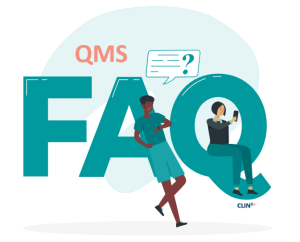Quality Management System (QMS) FAQ

Q: What is a Quality Management System (QMS)?
A: A Quality Management System (QMS) is a structured framework that includes policies, processes, and procedures to ensure the safety and effectiveness of medical devices throughout their lifecycle. It encompasses design, manufacturing, supplier management, risk assessment, complaint handling, and more.
Q: Why is a QMS important for medical device manufacturers?
A: A QMS is crucial for medical device manufacturers to ensure that their products meet quality and regulatory standards. It’s necessary for obtaining approvals from regulatory bodies and ensuring the safety of devices for their intended use.
Q: How does QMS compliance vary based on device classification?
A: Medical devices are classified according to their risk level. Different classifications require varying levels of compliance with regulations to ensure the device’s safety and reliability.
Q: Which international standards and regulations apply to QMS?
A:
Key standards and regulations include:
- ISO 13485: Specifies QMS requirements for medical device manufacturers.
- EU MDR 2017/745: Mandates QMS requirements for medical devices in the European Union.
- EU IVDR 2017/746: Similar to MDR, but with stricter requirements for in vitro diagnostic devices.
Q: What does ISO 13485 cover in terms of QMS requirements?
A: ISO 13485 covers aspects like general requirements, documentation, management responsibility, resource management, product realization, purchasing, production, measurement, analysis, and improvement.
Q: How does the EU MDR 2017/745 relate to QMS compliance?
A: EU MDR 2017/745 sets requirements for design, manufacturing, and distribution of medical devices in the EU. Manufacturers must establish and maintain a comprehensive QMS to achieve compliance.
Q: What are some key components of a QMS?
A: Key components include document control, change control, employee training, audit management, CAPA, supplier management, risk management, and complaint handling.
Q: When should a QMS be implemented?
A: Ideally, a QMS should be implemented during the design and development phase of a medical device. Existing QMS processes may also need refinement or updating to meet current requirements.
Q: What is the importance of a Medical Device File or technical documentation?
A: Every medical device type must have a technical file or documentation outlining the device’s specifications, performance, and compliance with regulations.
Q: What is the purpose of document control and record control in a QMS?
A: Document control manages the various documents used in the device lifecycle, ensuring proper version control and adherence to processes. Record control manages evidence that specific processes have been followed.
Q: How does design control fit into QMS requirements?
A: Design control ensures that a device’s design aligns with user needs, intended use, and specified requirements, covering various elements in the design process.
Q: What is the role of top management in QMS?
A: Top management is responsible for overseeing various aspects of the QMS, including quality policy, objectives, communication, and review.
Q: How does training contribute to QMS compliance?
A: Manufacturers must have trained and competent employees. Training records must be maintained to ensure that employees possess the necessary skills to perform their roles effectively.
Q: What is the significance of audits in QMS?
A: Regular quality audits are essential to ensure the entire QMS is compliant. Audit findings should be recorded as non-conformances for corrective action.
Q: How does Corrective and Preventative Actions (CAPA) work within a QMS?
A: CAPA processes address issues impacting device quality by collecting data, investigating problems, and implementing corrective and preventive actions. All these activities must be documented.
Q: How do production controls fit into QMS?
A: Production controls ensure that products meet specifications, processes are validated, and the manufacturing process is monitored and controlled for consistency.
Q: What's the key takeaway regarding QMS?
A: A QMS is a comprehensive framework that ensures medical devices meet quality standards, safety regulations, and are effective for their intended use. Manufacturers must adhere to international standards and regulations, implement key processes, and maintain a focus on continuous improvement.



